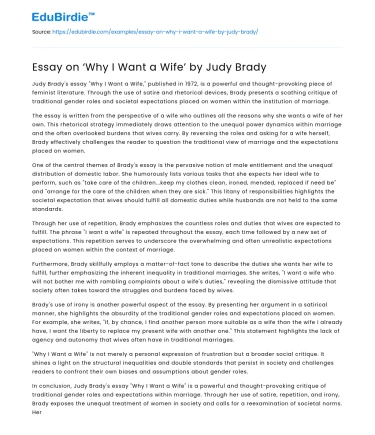Judy Brady's essay "Why I Want a Wife," published in 1972, is a powerful and thought-provoking piece of feminist literature. Through the use of satire and rhetorical devices, Brady presents a scathing critique of traditional gender roles and societal expectations placed on women within the institution of marriage.
The essay is written from the perspective of a wife who outlines all the reasons why she wants a wife of her own. This rhetorical strategy immediately draws attention to the unequal power dynamics within marriage and the often overlooked burdens that wives carry. By reversing the roles and asking for a wife herself, Brady effectively challenges the reader to question the traditional view of marriage and the expectations placed on women.
Save your time!
We can take care of your essay
- Proper editing and formatting
- Free revision, title page, and bibliography
- Flexible prices and money-back guarantee
One of the central themes of Brady's essay is the pervasive notion of male entitlement and the unequal distribution of domestic labor. She humorously lists various tasks that she expects her ideal wife to perform, such as "take care of the children...keep my clothes clean, ironed, mended, replaced if need be" and "arrange for the care of the children when they are sick." This litany of responsibilities highlights the societal expectation that wives should fulfill all domestic duties while husbands are not held to the same standards.
Through her use of repetition, Brady emphasizes the countless roles and duties that wives are expected to fulfill. The phrase "I want a wife" is repeated throughout the essay, each time followed by a new set of expectations. This repetition serves to underscore the overwhelming and often unrealistic expectations placed on women within the context of marriage.
Furthermore, Brady skillfully employs a matter-of-fact tone to describe the duties she wants her wife to fulfill, further emphasizing the inherent inequality in traditional marriages. She writes, "I want a wife who will not bother me with rambling complaints about a wife's duties," revealing the dismissive attitude that society often takes toward the struggles and burdens faced by wives.
Brady's use of irony is another powerful aspect of the essay. By presenting her argument in a satirical manner, she highlights the absurdity of the traditional gender roles and expectations placed on women. For example, she writes, "If, by chance, I find another person more suitable as a wife than the wife I already have, I want the liberty to replace my present wife with another one." This statement highlights the lack of agency and autonomy that wives often have in traditional marriages.
"Why I Want a Wife" is not merely a personal expression of frustration but a broader social critique. It shines a light on the structural inequalities and double standards that persist in society and challenges readers to confront their own biases and assumptions about gender roles.
In conclusion, Judy Brady's essay "Why I Want a Wife" is a powerful and thought-provoking critique of traditional gender roles and expectations within marriage. Through her use of satire, repetition, and irony, Brady exposes the unequal treatment of women in society and calls for a reexamination of societal norms. Her essay remains a relevant and important piece of feminist literature that continues to inspire conversations about gender equality and the need for change in the way we view and treat women in society.






 Stuck on your essay?
Stuck on your essay?

